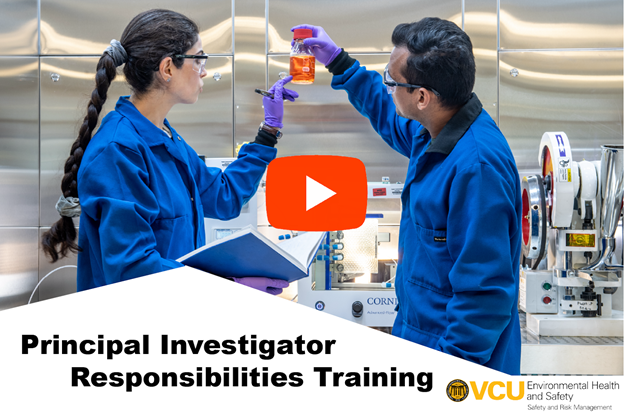Laboratory Principal Investigator Roles & Responsibilities
The Principal Investigator (PI) holds ultimate responsibility and accountability for the safety of the students, faculty, staff and volunteers who operate in the laboratory. The PI must lead by example, fostering a positive safety culture. The PI must make sure that all research adheres to VCU policy and regulatory guidelines by integrating safety as a fundamental aspect of experimental design. Additionally, the PI should cultivate an environment where faculty and staff feel empowered to raise safety concerns without fear of retaliation.
The PI is tasked with approving all work involving hazardous materials and providing lab members with clear instructions on safety concerns, mitigation strategies and experimental parameters. As the final authority on lab matters, the PI ensures that laboratory activities comply with VCU policy and regulatory guidelines.

SciShield
PIs must to maintain a lab profile in SciShield, the official university record-keeping application for lab safety compliance. This tool aids in lab management and ensures transparency between VCU Environmental Health and Safety and labs. The PI must make sure that the information in SciShield is accurate and up-to-date. While some data may be edited by a lab manager or lab safety liaison, the majority of information must be certified by the PI. The PI is responsible for regularly updating the following information and making changes as necessary:
- Lab member roster certifications: The PI must adjust and certify the lab member list when new members are added or removed.
- Annual hazard certification: Review and certify lab hazards as conditions or experimental scopes change in the lab. The PI must review and certify the lab hazards at least yearly.
- Safety assessments compliance: Address lab safety inspection reports within 30 days of receipt. The PI must acknowledge receipt of the lab safety reports and address them promptly. Failure to address findings in inspection reports within 30 days will result in escalation to the department chair.
- Chemical inventory reconciliation: The chemical inventory must be reconciled at least annually, or as chemicals are removed or added to the lab. This is university policy and a state requirement.
- High-hazard approvals: PIs who engage in high-hazard research as it is defined in VCU’s Chemical Hygiene Plan, must complete a high-hazard chemical registration form through SciShield. Examples of high hazards include working with explosive chemicals (TNT, etc.), toxic gasses (carbon monoxide, chlorine, etc.), pyrophoric gasses (e.g., Silane and cyanide agents) and hydrogenation reactions.
- Biosafety protocols: Work with biological agents or with recombinant or synthetic nucleic acids must have a protocol submitted to the Institutional Biosafety Committee.
- Training: Complete all required trainings, including "PI Responsibilities" training. Make sure all lab staff complete the required safety training.
Contact Us
Email srm@vcu.edu to set up a new lab orientation or for questions.
